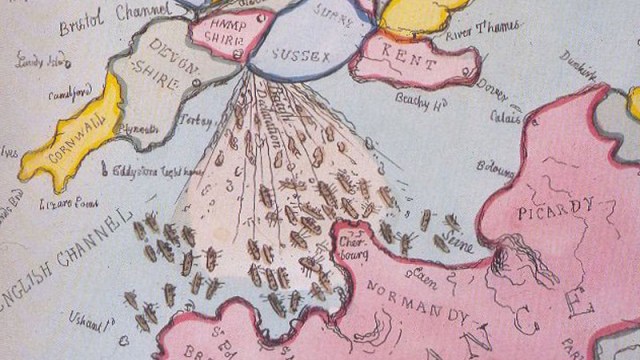181 – “Scotland – Land of Heroes and of Cakes”
n
A gallant piper, stuggling through the bogs,
nHis wind bag broken, wearing his clay clogs;
nYet, strong of heart, a fitting emblem makes
nFor Scotland – land of heroes and of cakes.
n
1869 saw the publication in London of a peculiar sort of atlas: ‘Geographical Fun: Being Humourous Outlines of Various Countries’. The book showed 12 anthropomorphic depictions of European nations, with as many stereotypes dressed in appropriately typical garb crouching and stretching to twist their bodies into a shape with the same outline as their countries.
n
The obvious intention was humourous, but in the introduction, ‘Aleph‘ (pseudonym of William Harvey) states that “it is believed that illustrations of Geography may be rendered educational, and prove of service to young Scholars who commonly think Globes and Maps but wearisome aids to knowledge (…) If these geographical puzzles excite the mirth of children, the amusement of the moment may lead to the profitable curiosity of youthful students and imbue the mind with a healthful taste for foreign lands.”
n
Those ‘foreign lands’ are:
n
• Wales, in the form of Owen Glendowr
n• Ireland as a peasant woman, with child
n• France as an Empress of cooks, fashions and the dance
n• Spain and Portugal in an ‘eternal’ union
n• Germany as a dancing lady
n• Prussia in the form of king Friedrich Wilhelm and chancellor Bismarck
n• Holland and Belgium as a pair of ladies (of greatly different size and stature)
n• Denmark as a female ice skater
n• England as Queen Victoria
n• Russia, of course, as a bear
n• Scotland, shown here, is a gallant piper, struggling through the bogs.
n• Italy as a freedom fighter, complete with Phrygian head-gear, then en vogue with revolutionaries.
n
An interesting anecdote concerning ‘Geographical Fun’ was related to me by Mike Pearce, who pointed out the contribution to the book by Lillian Lancaster, a stage performer in Britain and America, best remembered for singing the song ‘Lardy Dah’ on stage in New York (the origin of the still current expression ‘la-di-dah’). It turns out Lancaster (a.k.a. Eliza Jane) drew those maps at age 15, to entertain her bedridden brother. After her stage career, and having returned to Britain, Lancaster produced many more maps. A Mr Rod Barron is doing further research on Lillian Lancaster, and can be reached at his website (www.barron.co.uk).
n
Many people have directed me to the ‘Geographical Fun’ maps, 9 of which can be seen here (plus accompanying poems and with a link to the introduction of the book) at themaphouse.com, a map auction website.
n






